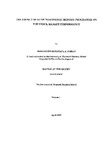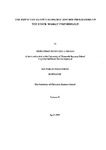Impact of Egypt's economic reform programme on the stock market performance
| dc.contributor.supervisor | Spratley, Derek | |
| dc.contributor.author | Omran, Mohammed Moustafa A. | |
| dc.contributor.other | Plymouth Business School | en_US |
| dc.date.accessioned | 2011-05-11T11:47:20Z | |
| dc.date.available | 2011-05-11T11:47:20Z | |
| dc.date.issued | 1999 | |
| dc.identifier | Not available | en_US |
| dc.identifier.uri | http://hdl.handle.net/10026.1/384 | |
| dc.description | This is a digitised version of a thesis that was deposited in the University Library. If you are the author and you have a query about this item please contact PEARL Admin (pearladmin@plymouth.ac.uk) | |
| dc.description | Merged with duplicate record (10026.1/848) on 03.01.2017 by CS (TIS) | |
| dc.description.abstract |
The objective of this thesis is to highlight the Egyptian experiment concerning its economic reform programme, and to determine whether this programme has affected Egypt's stock market performance. Using 18 years of data, which covered the period 1980/8 1 to 1997/98 and incorporates time periods prior to and after adopting the economic reform programme, the thesis empirically investigates three main issues. Firstly, there is an examination of whether the Egyptian government succeeded in implementing its economic reform programme by looking to the main economic indicators: nominal interest rates, real interest rates, the inflation rate, exchange rate stability, the real GDP growth rate, per capita income and the budget deficit in Egypt after 1991, and comparing them with the same indicators prior to this period. Secondly, the thesis considers the changes in Egypt's stock market after the introduction of the economic reform programme by measuring the changes in four main dimensions: market activity, market size, market liquidity and market concentration. Thirdly, and this is the main part of the thesis, the research concentrates on examining the impact of Egypt's economic reform programme on its stock market performance. For the first two issues, several logistic regressions are performed to determine whether the data prior to 1991 can be separated from the data relating to the period after 1991. The results from this analysis indicate clearly that both type of data series witnessed dramatic changes after 1991. As to the third issue, cointegration analysis is used to model the relationship between economic reform programme variables and the stock market performance variables within an error correction model form. Generally speaking, the results from this analysis demonstrate that economic variables have an impact upon various features of market activity, market size, market liquidity and market concentration. An important observation in this thesis is that Egypt still needs to accelerate its rate of growth, as it was the only independent variable, which did not show any significant change or significant impact upon the stock market performance variables. | en_US |
| dc.description.sponsorship | The Arab Academy for Science and Technology, Egypt | en_US |
| dc.language.iso | en | en_US |
| dc.publisher | University of Plymouth | en_US |
| dc.subject | Egyptian International trade | en_US |
| dc.subject | Finance | |
| dc.subject | Taxation | |
| dc.subject | Economics | |
| dc.subject | International Trade | |
| dc.subject | Economic Reform | |
| dc.title | Impact of Egypt's economic reform programme on the stock market performance | en_US |
| dc.type | Thesis | |
| dc.identifier.doi | http://dx.doi.org/10.24382/4615 | |
| dc.identifier.doi | http://dx.doi.org/10.24382/4615 |
Files in this item
This item appears in the following Collection(s)
-
01 Research Theses Main Collection
Research Theses Main



